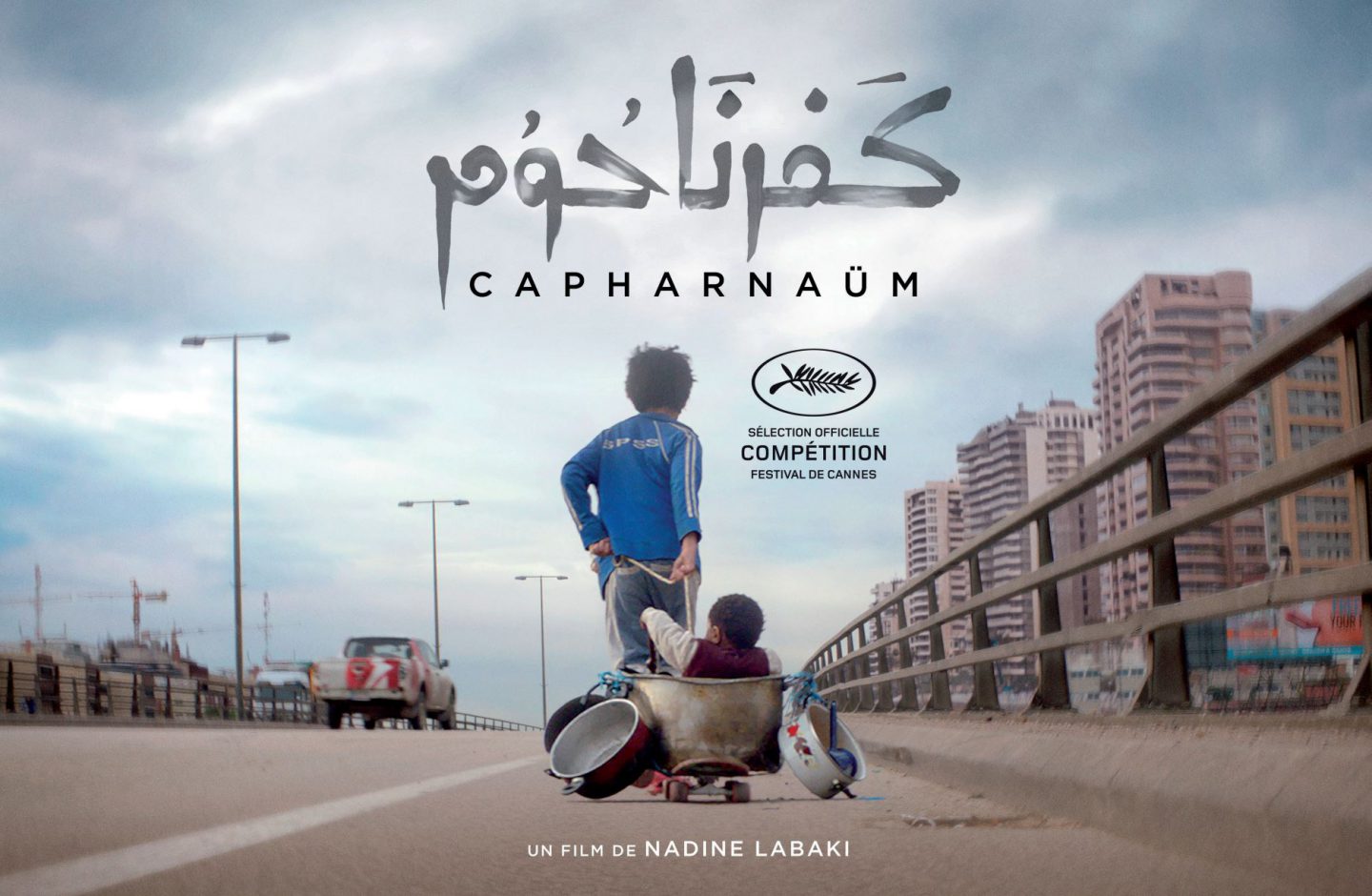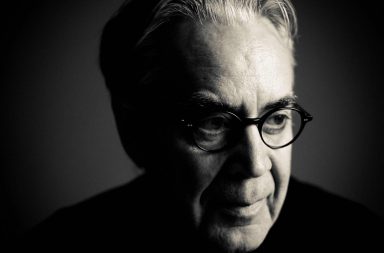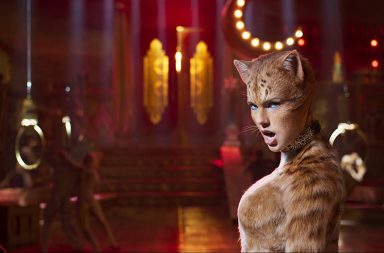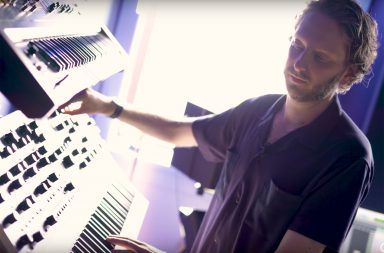An hour prior to our face-to-face interview with him, Khaled Mouzanar attended, along with other World Soundtrack Awards-nominated composers and a panel of journalists—including us at Score It Magazine—a roundtable discussion, in which he introduced himself saying: “I am a composer based in Beirut, and I don’t know if I’ll be able to travel back to my country because there’s a revolution going on right now.” The revolution in Lebanon started a few hours after he made it to Ghent, and his wife, Capernaum director Nadine Labaki, sent him pictures and videos of the streets of Beirut, where thousands of protesters—women, men, young, old, Muslims, Christians—expressed their rage towards a government that had just decided to raise drastically the phone taxes, leading this apolitical movement down in the streets, where they screamed their indignation towards an incompetent and corrupted political class, in a country where one third of the population lives under the poverty line.
Khaled Mouzanar’s collaboration with Nadine Labaki began twelve years ago with Caramel, followed by Where Do We Go Now? (2011). Capernaum, which won the Jury Prize at the 2018 Cannes Film Festival and was a nominee for Best Foreign Language Film at the latest Academy Awards, is their third feature film together. And you can tell just by looking at him that he managed, at 45, to channel the rage and the rebellious attitude—which are elements of his wife’s films—into a much steadier, almost shamanic presence, with his concerned gaze which he sometimes hides behind Aviator sunglasses, long black hair, a mid-length salt-and-pepper beard and a nonchalantly offhand, mellow voice. When he starts to talk, you bet he would tell you everything and even more, willingly bringing back the image of the great artists and thinkers of passed times—whom he never fails to mention—while keeping a strong down-to-earth awareness. Proof is that, in the same puzzling way he started to talk at the roundtable, his last words brought up the forbidden topic: ‘It’s a shame that not many film festivals give awards to the music. Many festival directors I’ve talked to consider music as being some technical stuff that’s inside a film […] We feel that injustice and I think it’s time to change things and get the recognition we all deserve,’ ending with a joke about the many hats he took on Capernaum, ‘so I don’t have to be a producer anymore.’
Even though he is an artist, Khaled Mouzanar would rather describe himself with the beautiful notion of craftsman, in which you get rid of all the symbolic and political elements to just keep your attention on the pure object of art and the beauty of it.
N.B. The following interview contains elements of the roundtable interview, which have been edited for clarity.
Score It Magazine: How big of a filmgoer are you?
Khaled Mouzanar: A big one. The love for film music can only come from loving films. I love any genre. I’m both a film lover and a literature lover: these are two worlds that, to me, come together in film music, because a film, to me, is first and foremost a script, that is, something written. Written words are the sparkle that enlightens my imagination. They bring me total freedom to envision what the score would end up being like and they allow me to go into places the director wouldn’t even think of going.
Does it mean that you feel restrained by the image?
When I have the image in front of me, I feel that it imposes me something that I don’t want because it already exists on the screen. For example, if I read the word ‘river,’ I can hear, say, tremolos and harps, but if I see an actual river on film, all I can hear is the sound of water. So, yes, the script is the trigger, then there’s the writing process, which I usually start on the piano. After that, I go to my studio, where I have hundreds of instruments, and I play a little bit of everything. It’s like when you cook something, you know: your intuition is going to lead you somewhere and you can’t explain why, but you know you have the right intuition. And the result is there, almost by miracle. The thing is, I love the freedom of words, but we’re in an industry where you rarely are there from the very beginning, so most of the time, you have to work from the image, which means you have to adjust yourself to the situation.
Can you tell us about your musical and cultural background and how it inspired and influenced you?
I think there are two kinds of things regarding an artist’s influence and background: there are things that you drink from your mother’s milk and things you learn. I mean, Bach or Mozart are things that we studied as composers, but what we drank from our mother’s milk is the way we look at things emotionally. When you’re Mediterranean, you’re more emotional than someone who comes from a colder country, or when you’re from a cold country, you’re less lazy than someone who comes from a hotter country… These are anthropological things that we have to deal with and that really influence us. I mean, you would never have had a Nietzsche in Nigeria or an Ovid in Siberia: every artist is led by his environment and climate. But we, as musicians, secrete music from our body, in the sense that it’s our language, and we’re sensitive to every kind of music in the world, whether it’s African, Chinese, Japanese… No matter where we come from, we, as musicians, can all be influenced by every kind of music.
My mother used to live in Mexico so I was quite aware of latin music—I’ve been a self-taught musician until 18, then I took classes with Armenian-Lebanese composer Boghos Gelelian, a master of contemporary classical music. I learned the rules of music with him and Johann Sebastian Bach. [Gelelian] used to tell me that if you want to reach the heart of someone with a melody, you have to be a bit Slavic, a bit Neapolitan and a bit African. So it’s all there. Of course, if you take a kid on the street in Damascus, he will sing naturally in quarter-tones. If you take a kid in China, he’ll sing in pentatonic form. This is what he drank in the milk of his mother. But musicians have access to this universal language physically, biologically, and we are emotionally permeable to all these kinds of language.
Many composers today find a new, creative way to compose music by recording and using everyday-life sounds. Given that experimentation is an important part of your work, is that something you’re interested in?
Now, I live in the forest, where I try to have an organic lifestyle, because I sow 80% of what I eat. And in the same way as I try my best to have an organic lifestyle, I try to have an organic sound. I treat my music the same way I treat my food: I build my own pre-amps, I work with self-made sounds, and so on until the final mixing step. There’s a whole process of putting science and art in the heart of the whole process, like a craftsman, and this approach is part of my inspiration.
Four years ago, I was commissioned by Maserati to write a piece for the brand’s 100th anniversary, and they wanted to do something with a car. It was a symphonic orchestral piece, and we discussed having the car playing within the symphonic orchestra, so I had to write a piece of music in which one of the instruments would be a car engine. Basically, the story of the piece was that Fangio, the legendary Argentinian driver, had just won a race with the Maserati car. So, I wrote a big tango in which we literally put the car in the middle of the symphonic orchestra—we did that live in Shanghai, in LA…—and used it as a rhythmic instrument. Since the only person that knew how to play that properly was the percussionist, we then put him inside the car and he ‘played’ the car. We also had to find out how to steer the car smoke outside the concert venue, and we had to lift the car because, of course, the wheels were turning. But at the end of the day, musically, you felt that Fangio himself was driving this crazy tango, it was really interesting.
You come from Beirut’s underground music scene…
Actually, I created a studio… I’ve always had home studios ever since I was 12, which then evolved in more elaborate studios. I’m interested in all types of music, whether it be ethnic, electronic, jazz, rock music… I lived in musical autarchy for a long time, alone with myself, in my studio, but at one point, I wanted to meet other people, other worlds, so I kind of opened the flying saucer so that other people would come in. Many people who came were part, at that time, in the 1990s-2000s, of the Beirut underground scene, and I became a producer for a lot of them. And hanging with them enriched my music as well.
Then came the short film After Shave, my first film score, my first actual cinematic experience. It was Hany Tamba, a director friend of mine, who asked me to write music for the film. It wasn’t a daunting experience, because ever since I was 16, 17, I’ve always wanted to try to do music for the image. When I listen to music or when I read a score, I see images. That was a normal evolution, and when he showed me his script, I immediately saw the music. Then the film won the César for Best Short Film and I that’s how I met Nadine Labaki, who asked me to score her first feature film, Caramel. That’s how it all started, even though at the time, I was more into songwriting, because I just got signed at Naïve Records for a solo album and these two worlds coexisted for a little while, until film music took over.
I love words, I love to write, I love songs as much as film music. But I kind of had the obsession of time going by, and even though I released an album in 2007, Les Champs Arides, I wouldn’t start a solo career as a singer-songwriter now, at 45. Now that I have a small career in film music, I can allow myself to do every now and then a solo album, with no rush or without any need to be a teenage idol or whatever it may be. Just a small work of art with lyrics. I’m working on one at the moment.
Capernaum is your fourth collaboration with Nadine Labaki and the third feature film you have done together, but this time, you are also a producer of the film. How did you manage to do both the down-to-earth aspect of being a producer and the creative aspect of being an artist?
There’s an artistic side of being a producer as well, you don’t see everything from a financial angle. Producers should have an artistic vision of the whole project. But that was the hardest experience I’ve always had in my life, because not only had I to manage these two aspects, but there was also a personal, human aspect, because Nadine is my wife, and all the film’s kids are kids from the street and not professional actors, who have problems, who need aftercare… Until now, actually, because we’re still following them in their lives. That was a full immersion in Beirut’s under-underworld, where we lived for two years. You can’t expect to get out intact of such an experience, and it changed everything in our family.
As a composer, the challenge was all the more difficult as normally, when your job is writing music, you’re completely focused on it. But here, for the first time, my concentration was scattered to smithereens. It was hard to focus only on the music when other issues kept falling upon me all the time.
And to make matters worse, Capernaum was a film that rejected the music: we were obsessed by the film’s realism—like I just said, the kids were unprofessional actors who almost played their everyday life—but when I began writing the music, the script asked for emotions. Then I was drawn into the reality, with its smell, its violence, and I realised that it wouldn’t work. Even after I completely changed the musical approach, the film still rejected the music. It took a lot of time for it to work, and I was my only judge. We shot more than 500 hours of rushes and the first cut of the film was 12 hours long, so we went through a lot of trial and error to make it down to 2 hours.
What did Nadine think about the role of the music ?
Nadine wasn’t able as much as myself to determine what to do. After we spent months trying things in the editing room, we decided to divide the film in parts. Some of them describe the raw reality of the street, with no music, and others which are much more poetic, in which there is a musical language. But Nadine was very afraid of the nature of this approach. I was in favour of keeping these poetic sequences within the film, but the day before we sent it to the Cannes Film Festival, I woke up thinking, ‘If the film doesn’t go to Cannes, it’ll be because of the music and we’ll get a divorce.’ (Laughs) So I went to the editing room and said to the guys, ‘I’m a producer this morning, not a composer. So get rid of all the music and send the film to Cannes.’ They were like, ‘Are you crazy?’ I said, ‘I don’t care, just do it.’ Then I left the editing room and stayed alone. The music represented six months of work and I had just made a crazy move. But later that day, Nadine watched the film in the editing room and decided to put back the music without telling me, and sent the film to Cannes herself. And thankfully, it was selected. That’s the kind of dilemma that a producer encounters, so basically, the moral of the story is that you can’t be your only judge.
Being a producer on Capernaum is a social and political act. How do you translate that into music?
In a country with huge issues, art can only be engaged. Artistically, big issues must be handled with big ideas. In countries where there are no real problems, art is withdrawn, it is more focused on loneliness, boredom, dereliction, these kinds of things in life. While when you are in what are called Southern countries, as in developing countries, cinema is much more interesting because it still deals with issues such as freedom or justice. An artist is like a sponge: it’s being sensitive to our environment, to people… We can only be influenced by the society we live in, and then influence it in return. History remembers more Victor Hugo than Napoleon III, who yet exiled him for 17 years. History doesn’t even remembers who ruled the German empire at the time of Mozart, Beethoven or Bach. History doesn’t even know anymore who ruled Italy at the time of Leonardo Da Vinci. All the artists I just mentioned were the ones who made history, who shaped it, and I believe that that’s what great artists still do. So, as an artist, you can only be concerned by the issues and the engagements that are dictated by your environment.
Would you consider one day writing a film score for someone else than Nadine?
I’m currently working on other projects in film, but I have to say that it’s convenient for me to work with my wife, because we’re behind every aspect of the project, like craftspersons, and we can do it from home, in slippers. But one day or another, you must take your slippers off, put on a pair of shoes and get out. I’m a shy person, so I find it more comfortable to work with people I know very well. It’s hard for me to get someone I don’t know listen to my music but I’m trying to overcome that musical barrier, which is interesting because it opens me up to other worlds. At the end of the day, you are at the service of the director and every one of them brings something new in terms of inspiration, but it’s very hard to have your music grafted onto someone else’s work of art.
I think that generally, European cinema, as well as Southern cinema, open the door more easily for the composer to freely express his art, but there’s always the possibility for one to come onto a project in which one would leave his artistic freedom to be just a simple music maker. Is it something that you fear in potentially working with other people?
I don’t think I’m able to do that. I understand what you say about European and Southern cinemas, because it’s still a craft, but being a music maker, like you put it, is not something I’m interested in. Besides, I’m at an age where every melody is important. You become more and more concerned by the possibility of the source to eventually dry up, and I would be stingy of beautiful things if the film I’m working on doesn’t require the artistic level I assert.
Interview prepared and conducted by Marine Wong Kwok Chuen.
Transcribed, translated and edited by Valentin Maniglia.
Thanks to Jan Boltze, Didier Van Hoorebeke, Karoline Balstrøm, Paul Stevelmans and Magdi Abdul-Kheir.
Special thanks to Valerie Dobbelaere, Thomas Van Parys and Carla Mardini.





